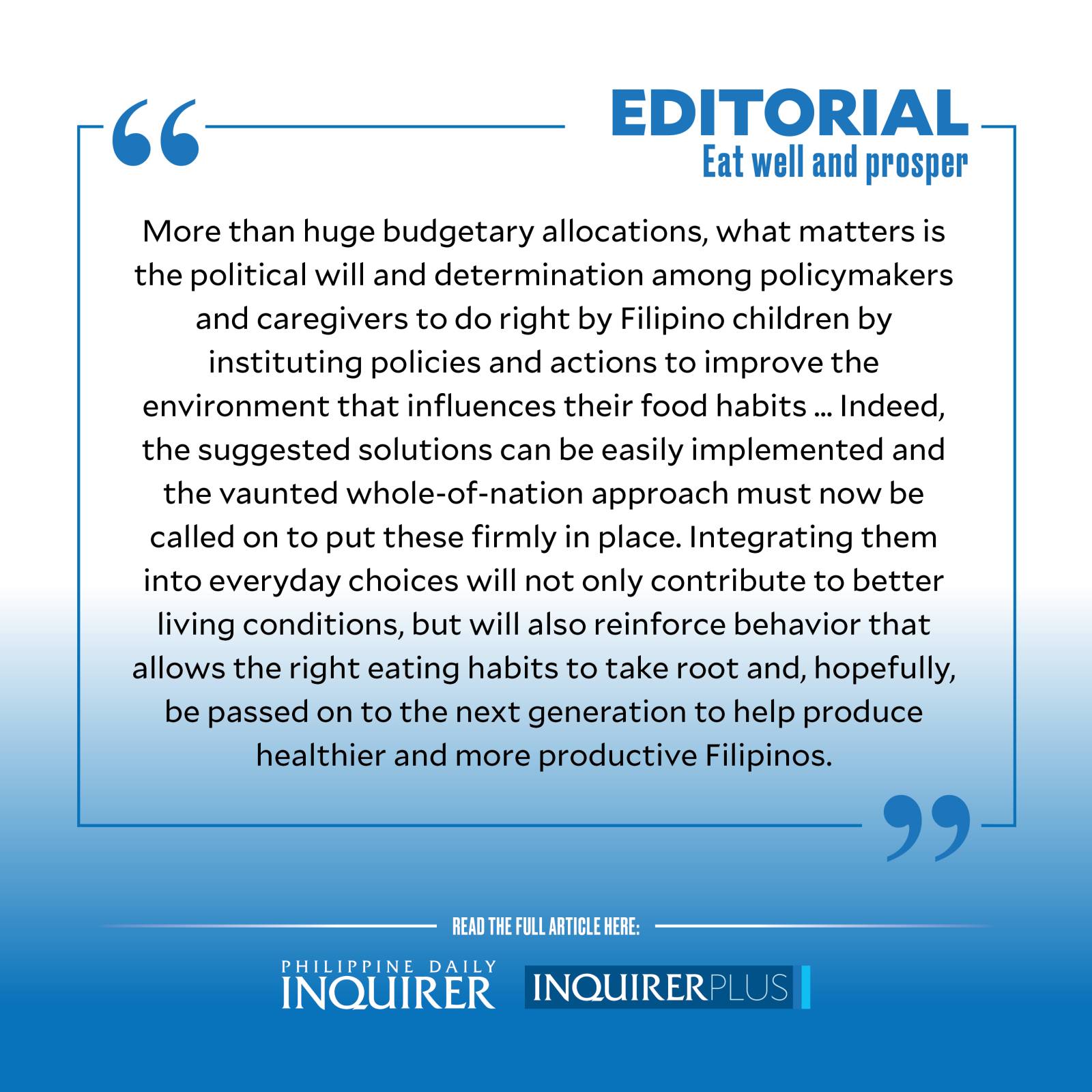Eat well and prosper

On March 8, the United Nations Children’s Fund (Unicef) issued a disturbing report: The diet of Filipino children has changed to the point that they are eating fewer nutritious fruits and vegetables, and more sugary, salty, and fatty food—a diet so unhealthy it would likely condemn them to a bleak future. Poor diet has contributed to the country’s triple burden of malnutrition, undernutrition through micronutrient deficiencies, and obesity rates that have increased significantly from 10.4 percent in 2019 to 14 percent in 2022 among children aged 5 to 10, and from 10.7 percent in 2019 to 13 percent in 2022 among adolescents 10 to 19 years old.
According to Unicef Philippines representative Oyunsaikhan Dendevnorov, such malnutrition constituted a “serious violation of a child’s right to adequate nutrition and can have serious long-term consequences on a child’s health, development, and well-being.” This point was earlier driven home by Ndiamé Diop, World Bank country director for Brunei, Malaysia, Philippines, and Thailand, who pointed out that children deprived of nutrition tend to be sickly, learn less, and are more likely to drop out of school than healthy children who’d likely do well in school and can look forward to a prosperous future. “Improving the nutritional status of children is key to the country’s goals of boosting human capital while strengthening the country’s economic recovery and prospects for long-term growth,” Diop stressed. Doing so will require a radical overhaul of the country’s food environment that Unicef found to have been “failing children,” leading to poor food choices and eating habits that make them too short, thin, fat, and weak, sorely lacking the essential vitamins and minerals they need to grow healthy minds and strong bodies.
Article continues after this advertisement“This triple burden of malnutrition is being driven by systems that are failing to provide children with adequate diets, space to play and exercise, access to safe water and hygienic environments, and financial security,” said Unicef. “The combined effects of the COVID-19 pandemic, climate change, and economic recession are intensifying these systematic failings, with rising food, fertilizer, and fuel prices hitting poor families particularly hard,” it added.
Fortunately, Unicef’s deep dive into the “lived experiences” of Filipino children in different parts of the country with prevailing high levels of nutrition provides the Philippine government and other concerned individuals and institutions a suggested road map to provide children access to healthier diets and living conditions that support their growth and development. Particularly heartening is the fact that the suggested policy and behavioral changes do not require large capital outlays, with the benefits immediately felt by the children, their families, and communities.
More than huge budgetary allocations, what matters is the political will and determination among policymakers and caregivers to do right by Filipino children by instituting policies and actions to improve the environment that influences their food habits. The Unicef study, for example, revealed how one infant was being fed milk formula instead of the more nutritious breast milk because the product’s label said it would help her grow stronger. Thus, it was suggested that the country’s Milk Code be strengthened and enforced more rigorously to restrict the marketing of breast milk substitutes.
Article continues after this advertisementThe Unicef report also cited how parents sometimes do not have enough time nor energy to cook food at home, so they turn to fast food joints that sell ultraprocessed food high in salt, fat, and sugar, or resort to serving instant noodles and canned food that are lacking in nutrients. The agency thus suggested that menu labeling be introduced in fast food restaurants to indicate the nutritional content of the food and drinks that greatly appeal to Filipino children, as well as mandatory nutrition labeling on packaged food to encourage better eating choices.
Other suggestions include supporting advocacy campaigns to promote traditional food based on local produce; engaging with and supporting carinderias and street vendors for them to sell healthier food; improving road networks in rural areas for a more efficient supply chain, and restricting the aggressive marketing of unhealthy food and snacks to children. Also stressed is the need to improve the availability of locally produced food at affordable prices to make nutrient-rich meat and eggs accessible to poor Filipinos who need them the most.
Indeed, the suggested solutions can be easily implemented, with the vaunted whole-of-nation approach applied to put them firmly in place. Integrating them into everyday choices will not only contribute to better living conditions, but will also reinforce behavior that allows the right eating habits to take root and, hopefully, be passed on to the next generation to help produce healthier and more productive Filipinos.
















